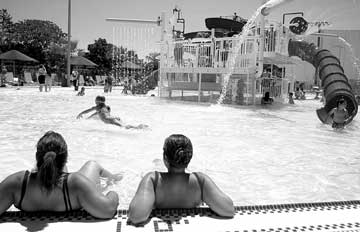Morgan Hill
’s new Aquatics Center lost about $358,000 in its first year of
operation and only recovered about 74 percent of its expenses,
according to a city-released report.
n By rose Meily
Staff Writer
Morgan Hill’s new Aquatics Center lost about $358,000 in its first year of operation and only recovered about 74 percent of its expenses, according to a city-released report.
And the bills are still coming in from the last fiscal year that ended on June 30, according to Acting Recreation and Community Service Manager Melissa Dile.
“Is it going to get worse?” Councilman Mark Grzan asked when council members learned of the Aquatics Center’s losses.
“I hope not,” Dile said. “We think it’s unlikely, but I hope not.”
The losses were at least $83,000 more than what the city projected when the new facility opened last year. And though the Aquatics Center has been popular with some local residents, breaking single-day attendance records during the summer heat, it failed to meet its estimated revenue by about $104,000.
The city attributes much of the losses in its first year of operation to “growing pains,” said Dile. The city initially projected the center would cover its expenses in the first year of operation.
The city knew in May the Aquatics Center was running over budget, Dile said. Last fall, the city council decided to keep the center’s recreation pool open through October, which drove up operating expenses. Dile also said other mistakes contributed to the loss, such as intentionally setting prices lower than costs to encourage community use, and banking on new programs that didn’t earn expected revenues.
Likewise, Dile said the city was too aggressive when estimating revenues and did not anticipate the effect of deferred income, such as season passes, which add revenue into the budget over two fiscal years. Additionally, worker compensation costs and energy bills were higher than anticipated.
Dile said the city has learned from its mistakes and the facility should only cost the city $121,000 this year or about 9 percent of its operating expenses.
“We think it is achievable and necessary to meet the cost recovery of 90 percent or better,” said Dile.
Dile said this year, the city will market fall programming more aggressively and successful programs like water fitness, private lessons and Masters swimming will be continued. The city will close the recreation pool on Labor Day and open on Memorial Day, but it plans to rent the competition pool year-round for the swim team, water polo practice and competitive swim meets. New software will better track operations and monthly reports, staff will evaluate concessions and retail staffing. They will explore more opportunities for rental use by corporations, daycare centers and Gavilan College, as well as new programs like scuba lessons and kayaking. They will also seek a supervisor and part-time recreation coordinator.
The operating plan does not call for rate increases, but it will be evaluated over the next year, Dile said.
Dile indicated fewer people frequented the facility in June/July this year compared to last year, but the city received more revenue. Last year, 46,637 persons visited the center during those months; this year, 39,896 people. The city obtained $401,286 in daily revenue this year, compared to $375,630 for the same period last year. She attributed this to an increase in rates and concessions.
After her presentation, discussion among city council members centered upon ways to improve maintenance of the facility. Members of the Masters program spoke, praising the program and supporting keeping the center open year-round. Geno Acevedo said the El Toro Brewery Water Polo team meets on Saturdays and asked the city to consider opening the pool for the team. He also suggested having a quick-open plan and keeping the pool during an Indian Summer period, when the weather gets warmer.
Councilman Larry Carr said there were many “lessons learned from it, and we can see how we can improve.”
Grzan disagreed, stating they may have discovered the “reality” of city-operated recreation facilities.
“The losses that occurred this year were not completely unexpected, but I don’t know of any municipal program that makes 100 percent cost recovery, whether it be an aquatic facility or even the indoor recreation center,” he said. “It’s just not happened; it’s just not there. … It’s just not what recreation centers do. To me, it’s an unrealistic goal. Why not seek other economic opportunities to increase our General Fund to balance (our losses) so we can support (the facility).
“The reality is, find other revenue sources to support these programs so we can continue these programs year-round. The best we can hope for is 80 percent recovery. That’s the reality,” Grzan said.
Councilman Greg Sellers said the errors made in the first year of the center should not overshadow its success and popularity.
“We’ve made some mistakes, but I think it can be corrected,” he said. “Let’s move forward.”
Rose Meily covers City Hall for the Morgan Hill Times. Reach her at 779-4106 or by e-mail at rm****@*************es.com.








